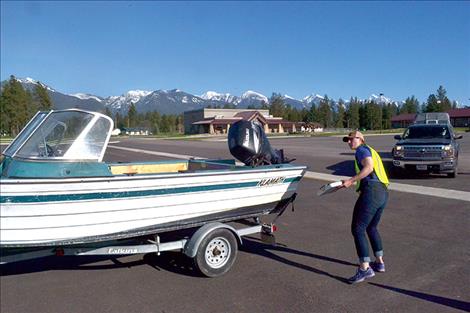Hitch seal watercraft now, save time later
Hey savvy news reader! Thanks for choosing local.
You are now reading
1 of 3 free articles.
News from Flathead Basin Commission
During the 2017 legislative session, House Bill 622 was passed into law. This statute provided the Flathead Basin Commission with the authority to create an Upper Columbia Pilot Program to better protect the Basin from the possible introduction of invasive mussels and other Aquatic Invasive Species. It is anticipated that the pilot program will entail enacting regulations for the 2018 boating season to bolster existing on-the-ground operations, including requirements for inspection prior to launch for Flathead and Swan Lakes.
The pilot program will be undertaken in partnership with the Confederated Salish and Kootenai Tribes, as well as Glacier National Park, the City of Whitefish, the Blackfeet Nation and Fish, Wildlife and Parks. Caryn Miske, executive director of the Flathead Basin Commission stated, “the goal is to unify the AIS prevention program in the Flathead region to the greatest extent possible, while providing a heightened level of protection for our local resources.” It is anticipated that new rules will be in place for the start of the 2018 boating season, so the FBC is encouraging boaters with ballast tanks, ballast bags or live wells, to get their boats hitched sealed at the end of the boating season. Intact hitch seals from 2017 will allow boaters to forego a decontamination at the start of the 2018 boating season. “Getting a hitch seal when you’re ready to wrap up boating for the 2017 season will save both boaters and watercraft inspectors time and effort in 2018,” said Miske.
The Confederated Salish and Kootenai Tribes passed their own AIS regulations this year, and will be working with the FBC on the inspection before launch effort. Erik Hanson, the CSKT AIS Coordinator said, “We are the headwaters of the Columbia River Watershed, if we don’t step up and do our part to protect our waters, the entire Columbia River could become infested with mussels.”
So far this year, the Flathead region has performed well in terms intercepting mussel-fouled boats. The Kalispell station at Jesco Marine and Power Sports intercepted one watercraft; the Blackfeet station at highway 89 intercepted one watercraft; and the Blackfeet Station at Seville intercepted two. The state as a whole has intercepted a total of 17 boats this field season, so the detections in the Flathead region represent almost 25 percent of the total number of detections. “Our numbers of detects are solid,” says Jan Metzmaker, the FBC Chair, “but next year we plan to step things up even more to ensure that our waters remain mussel-free.”
More information regarding the new FBC/CSKT AIS rules will be presented at the upcoming FBC meeting on September 27, 2017 in Hungry Horse.
















